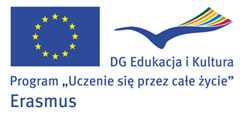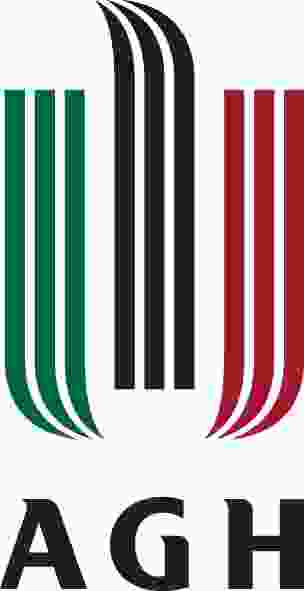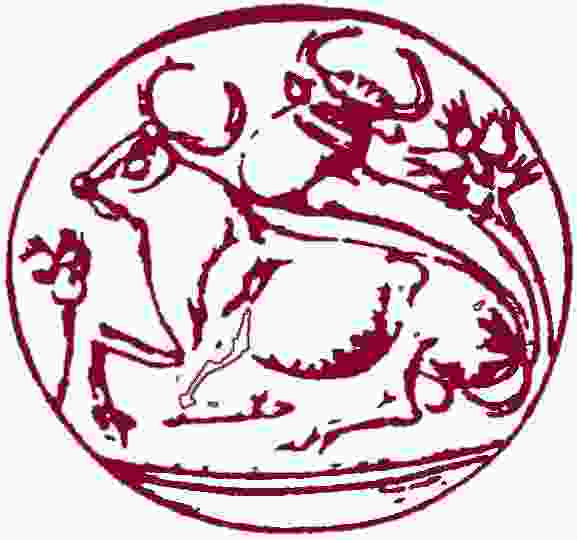Home
IPNeT is an LLP ERASMUS Intensive Programme closely connected with CoNeT Project (Co-operative Network Training). Its topic is Modern Data Transfer Standards for Industrial Automation. The main goal of IPNeT is to train participants how to design, build, configure, program and troubleshoot industrial automation systems utilising different industrial networks for data exchange. IPNeT is a short-term intensive course gathering students from several universities form Europe.
The second edition of the IPNeT takes place at Technological Educational Institute of Crete in Heraklion, Crete, Greece from 15th till 28th of July 2012.
On this site all the information regarding accommodation, timetable and curriculum of the IP will be posted in due time.
Universities
There are six universities engaged in the IPNeT Intensive Programme:
- AGH University of Science and Technology (Kraków, Poland) - the coordinator of IPNeT and the host of the 1st edition of the programme (IPNeT 2011)
- Fachhochschule Düsseldorf (Germany)
- Karel de Grote-Hogeschool (Antwerp, Belgium)
- Ruse University "Angel Kanchev" (Bulgaria)
- Technological Educational Institute of Crete (Heraklion, Greece) - the host of the 2nd edition of the programme (IPNeT 2012)
- Yildiz Technical University (Istanbul, Turkey)
News
Time and venue
Date
| Arrival day: | 15 July 2012 |
| Departure day: | 28 July 2012 |
Venue
| Technological Educational Institute of Crete |
| Greece, Crete, Heraklion |
Street maps
| You can find a precise street map of Heraklion and Technological Educational Institute campus on Google Maps: http://maps.google.com/maps?f=q&source=s_q&hl=en&geocode=&q=tei+of+crete... |
Simplified street map of Heraklion
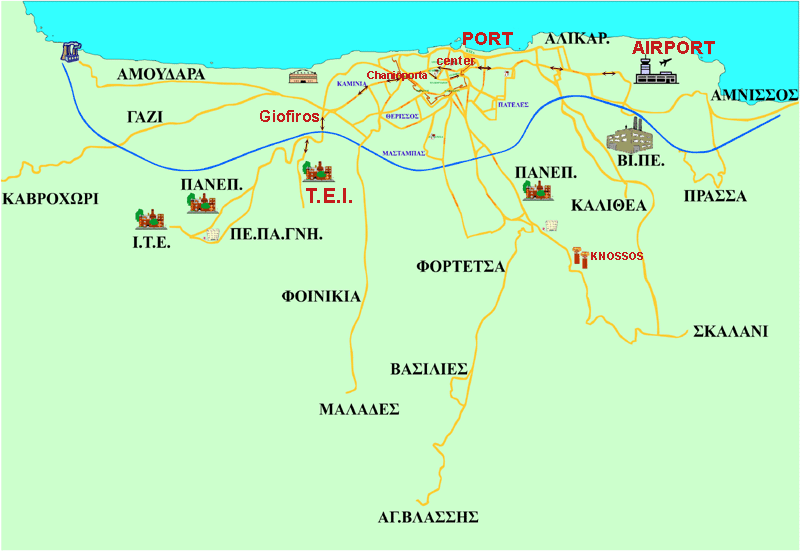
|
Simplified street map of TEI
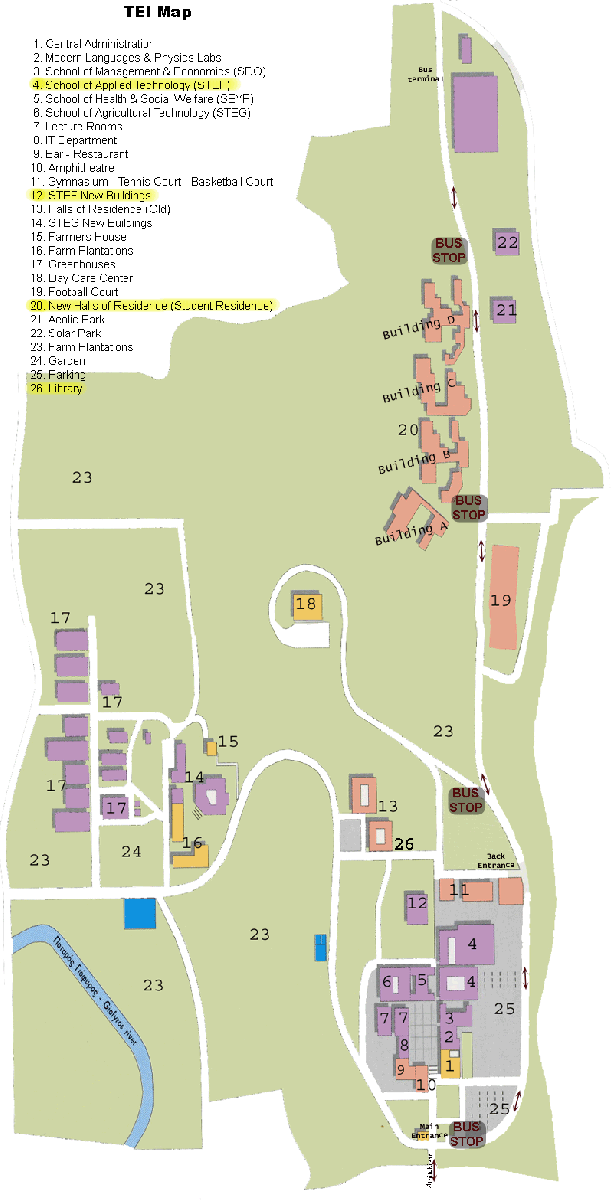
|
Teachers
Below there is a list of teachers participating in IPNeT.
| N | Name | University | City, Country |
| 1 | Sofie Krol | KdG Karel de Grote University College |
Antwerp Belgium BE |
| 2 | Tzvetelina Draganova | RU University of Ruse |
Ruse Bulgaria BG |
| 3 | Oleg Makarov | FH D University of Applied Sciences |
Dusseldorf Germany DE |
| 4 | TEI Technological Educational Institute of Crete |
Heraklion Crete Greece GR |
|
| 5 | Dariusz Marchewka Maciej Rosół |
AGH University of Science and Technology |
Cracow Poland PL |
| 6 | Levent Ucun Onur Akbati |
YTU Yildiz Technical University |
Istanbul Turkey TR |
| 7 | Hassan Kaghazchi | UL University of Limerick |
Limerick Ireland IE |
Other people involved in the Intensive Programme.
| N | Name | University |
| 1 | Erwin Smet - Quality Coordinator |
KdG Karel de Grote University College |
| 2 | Andrzej Tutaj - IP coordinator |
AGH University of Science and Technology |
Transportation
Heraklion is the largest urban centre in Crete, the capital of the region and the economic centre of the island.
How to reach Heraklion:
By air:
There is a considerable number of flights daily (10-20 depending on the season) connecting Heraklion International Airport "Nikos Kazantzakis" (HER) with the Athens International Airport "Eleftherios Venizelos" (ATH). There are also direct connections from Heraklion to various Greek islands as well as to major European cities. Aegean Air and Olympic Air are the major carriers to Athens. There is also Sky Express company.
The distance from the airport to Heraklion centre is approximately 5 km.
By sea:
There are now three ferries going daily between Athens (Departure from Piraeus Port) and Heraklion:
Public transport
There is a frequent public bus service from the Heraklion airport to the centre of town as well as from the center of town to Technical Educational Institute campus. It is necessary to buy your tickets prior to getting onto a public bus. You can buy bus tickets from ticket machines at "Platia Eleftherias" Square and at some of the kiosques. The current price of the bus-tickets is 1.10 Euros (one way) from Airport to the center of town or from the center of town to TEI of Crete.
From the airport and the port as well as from the city center, you can reach the TEI of Crete by bus No. 5 (A.T.E.I). The bus stop in front of the main TEI entrance and in front of TEI of Crete student residence (this is the last bus STOP). There are bus stops in the city center. The main stop is in "Platia Eleftherias" Square.
The use of a taxi is also a convenient and relatively expensive mean of transportation in Heraklion. Taxis in Heraklion are silver. You can find a lot around in the city streets. You can find them also waiting at the airport, the port, the bus stations, in the Lion's, and the "Platia Eleftherias" Square. From the Airport to the center of town, the cost of a taxi is approximately 15 to 20 Euro. From the center of town to TEI, the cost of a taxi is approximately 6 to 8 Euro.
Accommodation
Students comming from abroad for the Intensive Programme are going to be accommodated in dormitories located inside the campus of Technological Educational Institute of Crete. They will be also provided with two meals a day (breakfast and lunch). Accommodation and food is paid from the Intensive Programme budget. However students have to take care of their dinner and pay for it themselves.
Timebable
| 1 | Sunday | 15 July 2012 | Arrival day | |
| 2 | Monday | 16 July 2012 | 9:00 - 12:00 | Soft skills workshop |
| 13:00 - 16:00 | Module 1* | |||
| 3 | Tuesday | 17 July 2012 | 9:00 - 12:00 | Module 1 |
| 13:00 - 16:00 | Module 1 | |||
| 4 | Wednesday | 18 July 2012 | 9:00 - 12:00 | Module 1 |
| 13:00 - 16:00 | Modules 2, 3, 5 - Theory | |||
| 5 | Thursday | 19 July 2012 | 9:00 - 12:00 | Modules 2, 3, 5 - Practise |
| 13:00 - 16:00 | Modules 2, 3, 5 - Practise | |||
| 6 | Friday | 20 July 2012 | 9:00 - 12:00 | Modules 2, 3, 5 - Theory |
| 13:00 - 16:00 | Modules 2, 3, 5 - Practise | |||
| 7 | Saturday | 21 July 2012 | Free day | |
| 8 | Sunday | 22 July 2012 | Free day | |
| 9 | Monday | 23 July 2012 | 9:00 - 12:00 | Modules 2, 3, 5 - Practise |
| 13:00 - 16:00 | Modules 2, 3, 5 - Theory | |||
| 10 | Tuesday | 24 July 2012 | 9:00 - 12:00 | Modules 2, 3, 5 - Practise |
| 13:00 - 16:00 | Modules 2, 3, 5 - Practise | |||
| 11 | Wednesday | 25 July 2012 | 9:00 - 12:00 | Module 8 |
| 13:00 - 16:00 | Module 8 | |||
| 12 | Thursday | 26 July 2012 | 9:00 - 12:00 | Module 8 |
| 13:00 - 16:00 | Problem solving session Part 1 - Problem formulation | |||
| 13 | Friday | 27 July 2012 | 9:00 - 12:00 | Problem solving session Part 2 - Consultations |
| 13:00 - 15:00 | Evaluation | |||
| 15:00 - 16:00 | Closing ceremony | |||
| 14 | Saturday | 28 July 2012 | Departure day |
* For modules topics please consult Curriculum section.
Curriculum
- Module 1 - Basics of Ethernet based I/O systems
- Module 2 - PROFINET on Siemens platform
- Module 3 - PROFINET on Phoenix Contact platform
- Module 5 - EtherNet/IP on Allen-Bradley platform
- Module 8 - PROFIBUS on Siemens Platform
Reqiurements
An applicant is required to:
- be graduate student
- have a good command of spoken and written English
- be able to work and live in a multicultural team
- know the basics of PLC configuration and programming
- know the basics of PC usage
Fees
Each student participating in the IPNeT Intensive Programme is obliged to pay a participation fee of 150 EUR and also has to participate in travel expenses.
Enrolment
Each participating university is responsible for recruiting their students.
Registration
Each student selected for the intensive programme is kindly requested to fill in a personal data form and to send it to the address ipnet![]() agh.edu.pl.
agh.edu.pl.
Nabór studentów AGH
Ogłoszenie i formularz zgłoszenia
Pobierz informację o naborze studentów Akademii Górniczo-Hutniczej na kurs intensywny IPNeT wraz z formularzem zgłoszenia (dwustronicowy dokument w formacie PDF): Ogłoszenie-formularz
Plakat
Pobierz plakat reklamujący kurs intensywny IPNeT: Plakat
Test kwalifikacyjny dla studentów AGH na kurs intensywny
W związku z faktem, iż liczba podań na kurs intensywny IPNeT przekroczyła liczbę wolnych miejsc, w środę 25 kwietnia 2012 o godzinie 16:30 w sali 315a w pawilonie B-1 przeprowadzony zostanie pisemny sprawdzian kwalifikacyjny dla zgłoszonych kandydatów. Tematyka sprawdzianu będzie obejmowała zagadnienia związane z programowalnymi sterownikami logicznymi PLC oraz z sieciami cyfrowego przesyłu danych stosowanymi w automatyce przemysłowej.
Teaching materials
The IPNeT intensive programme utilizes teaching materials prepared by the CoNeT project partners.
|
Module 1
Basics of Ethernet based IO systems |
Ethernet_Based_IO_Systems_Lecture_Notes.pdf |
|
Module 2
Profinet on Siemens platform |
ProfiBus_overview.pdf
PROFINET_Basis.pdf Profinet_HW_Config1_v1.pdf Profinet_IO_Diagnostics.pdf SIMATIC_MANAGER.pdf |
|
Module 3
Profinet on Phoenix Contact platform |
CML3_lesson_part_1_checked.pdf
CML3_lesson_part_2_checked.pdf CML3_profinet_basics_students_checked.pdf CML3_profinet_engineering_students_checked.pdf CML3_user_manual_en_v1.1_checked.pdf |
|
Module 5
EtherNet/IP on Allen-Bradley platform |
Module5-Lectures.pdf
Module5-Exercises.pdf Module5-UserManual.pdf |
| Module 8 |
Assessment
Final grade ingredients and their weighting factors (the final mark is calculated as a weighted average):
- Soft skills workshop and preliminary presentations - 2/10.
Students should prepare preliminary presentations before the IP at home. Students from a single country prepare one presentation together. The presentation should containg some information about students' country, city, university in general and focusing on the automatics/automation topics, and about students themselves. The presentation should take about 10 minutes and should engage all students from a particular country (2,5 minutes per one student on average). - Attendance during the IP - 1/10.
- Peer assessment during practical classes - 3/10.
- Report of problem solving - 4/10
During the IP students are going to be given problems (assignments) to solve. After the IP, at home they will work out solutions, prepare reports and send them to teachers for evaluation.
ECTS
Contact
Publications
The first edition of the IPNeT Intensive Programme has been presented in an article entitled Nauczanie współczesnych technologii transmisji danych w systemach automatyki przemysłowej. Międzynarodowe projekty CoNeT oraz IPNeT published in the Biuletyn AGH. Magazyn Informacyjny Akademii Górniczo-Hutniczej magazine in January 2012 (No 49). The magazine is available online and can be accessed here.
The second edition of IPNeT has been described in the same magazine in an article entitled Druga edycja kursu intensywnego IPNeT in February 2013 (No 62). The magazine is available here.
Useful links
Lifelong Learning Programme - European Commission | Education & training | Lifelong Learning Programme
ERASMUS Programme - European Commission | Education & training | Lifelong Learning Programme | Erasmus
ERASMUS Intensive programmes - European Commission | Education & training | Erasmus | Intensive Programmes
CoNeT - Co-operative Network Training - offical project website.
AGH University of Science and Technology - official university website.
Technological Educational Institute of Crete - official university website.
